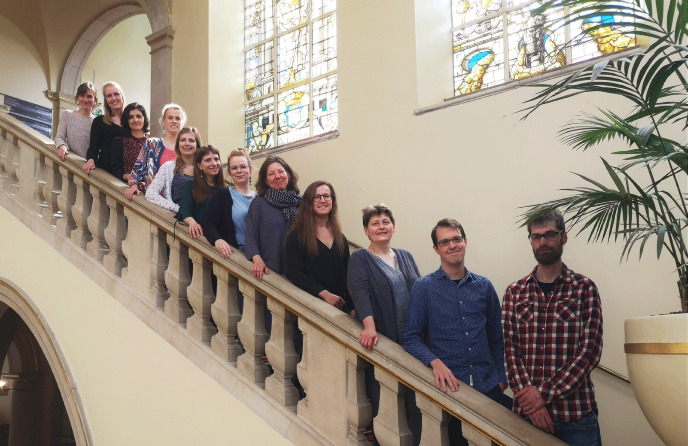Neurolinguistics and Linguistic Disorders
Project: SemCogLab & Healthy Ageing
The Semantics and Cognition Lab ( SemCogLab ) studies patterns of meaning and interpretation in language, whether and how cognitive processes influence the linguistic capacity to understand others, and how this linguistic capacity to understand others typically develops in children or can become impaired. To investigate this question, both behavioral and online research methods are used, such as reaction time experiments, EEG, eye-tracking, and pupillometry.

Researchers
-
Prof. Dr. Petra Hendriks is the head of the Semantics and Cognition Group at the Faculty of Arts of the University of Groningen. Her research interests are in semantics, pragmatics and language acquisition, where the relation between linguistic abilities and cognitive skills play a central role
-
Dr. Emar Maier is assistant professor affiliated with the Faculty of Philosophy and the Faculty of Arts, specializing in formal semantics. He is currently heading a NWO VIDI research project investigating the semantics of imagination and fiction. His research interests include narrative, quotation, indexicals, and attitudes
-
Dr. Atty Schouwenaars is part of the Lab and working on language developmen
-
Dr. Simone Sprenger is assistant professor in the SemCogLab. She is currently studying idiom processing, bilingualism and the way in which language processing changes across the lifespan. In addition, together with Jacolien van Rij (Dept. of Artificial Intelligence) she leads a large-scale project Maak dat de kat wijs on the development of idiom familiarity across the lifespan for the National Weekend of Science 2019
PhD Projects
The SemCogLab has several other projects on language development across the lifespan. Our group is highly interdisciplinary, with more than half of the PhD projects spanning different faculties: Philosophy, Medical Sciences (Psychiatry, Audiology), Science and Engineering (Artificial Intelligence), and Behavioural and Social Sciences (Orthopedagogy). Associated PhD students receiving supervision from the Semantics and Cognition group are Merel Semeijn (Faculty of Philosophy) and Abby Toth (Faculty of Science and Engineering).
-
Vera Hukker is particularly interested in how children learn to understand figurative language. In her project she investigates how children learn to understand verbal irony by looking at the relation between irony understanding and social, linguistic and cognitive factors
-
Irene Mognon is keen on studying phenomena at the interface between syntax, semantics, and pragmatics, especially in children and in atypical populations. Adopting an experimental approach, in her PhD project she investigates language acquisition in children with and without Autism Spectrum Disorder, focusing in particular on the relationship between cognitive abilities, such as Theory of Mind, and linguistic skills
Project: Apraxia of Speech - Diagnosis and Therapy
Apraxia of Speech (AoS) is a speech motor disorder that in general results from vascular brain damage. Within this project headed by Roel Jonkers , the diagnostic instrument for Apraxia of Speech (DIAS) was developed (Feiken and Jonkers, 2012). Afterwards , Judith Feiken has been developing a therapy programme, the Therapeutic Instument for Apraxia of Speech, which was published as part of the Speech Therapy app (STAPP). Joost Hurkmans has evaluated the therapy programme SMTA on its effeciveness. In 2020, the Norwegean addaptation of the DIAS, Diagnostisk verktøy for taleapraksi, was published.
Researchers
Project: Language testing in awake brain surgery & language networks
Awake brain surgery is a multidisciplinary procedure applied to people with brain tumors, epilepsy, and Parkinson’s disease. Within this project, headed by Roel Jonkers and Adrià Rofes (VIDI awardee), we develop new tools to assess language during surgery in people with brain tumors (e.g., action naming, semantic relations). Also, we study new ways to extract as much information as possible from language tasks, by looking at item-based variables (e.g., word properties such as frequency, age of acquisition, concreteness) and also network metrics (e.g., modularity, cluster coefficient). We use these to better grasp the behavioral underpinnings of the tasks, at what language level may people have difficulties with language (e.g., lexical, semantic) as well as the cortical and subcortical representation of language. We use behavioral testing, as well as different techniques, namely, navigated Transcranial Magnetic Stimulation (nTMS), Direct Electrical Stimulation (DES), and structural neuroimaging, including tractography.
PhD Projects
Jo-Anne van der Sluijs focuses on the theoretical study of network metrics, also applied to people with neurological disorders. Jo-Anne has developed a new morphological fluency task and is now interested in understanding the best methods to derive network metrics with it. Jo-Anne also works on word association tasks.
Logan Gaudet studies fluency tasks and word association tasks in people with brain tumors. Logan also uses network metrics to understand whether the so-called semantic networks only indicate conceptual representations or also lexical representations. Logan is working on a project between the University of Groningen and the Sorbonne in Paris.
Lena Rybka studies the relation between working language and memory, focusing on digit and word span tasks. Lena is also interested in the relation between language and memory tasks and quality of life/return to work in people with brain tumors. Lena is working on a project between the University of Groningen and Charité Universitätsmedizin Berlin.
| Last modified: | 06 February 2025 4.51 p.m. |
